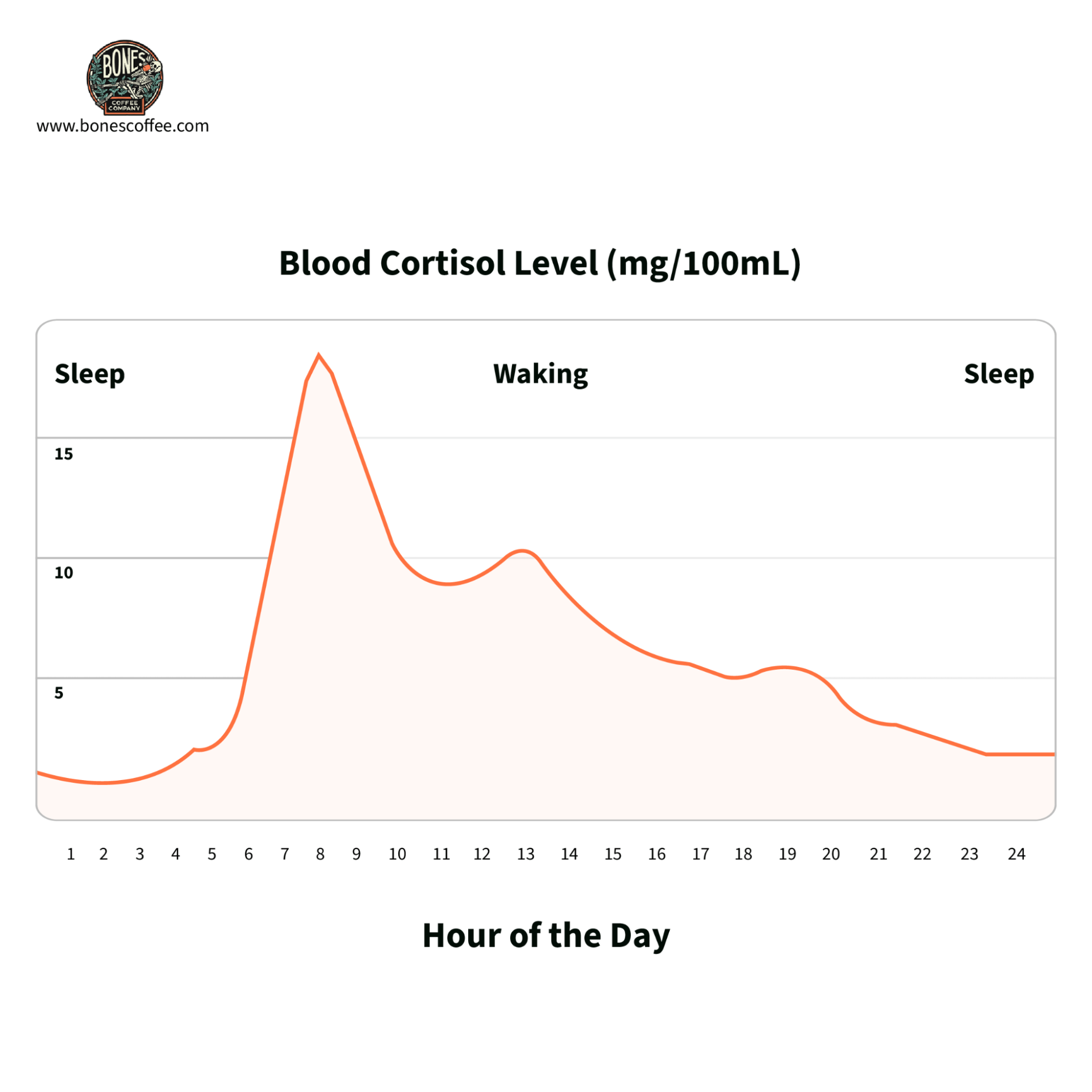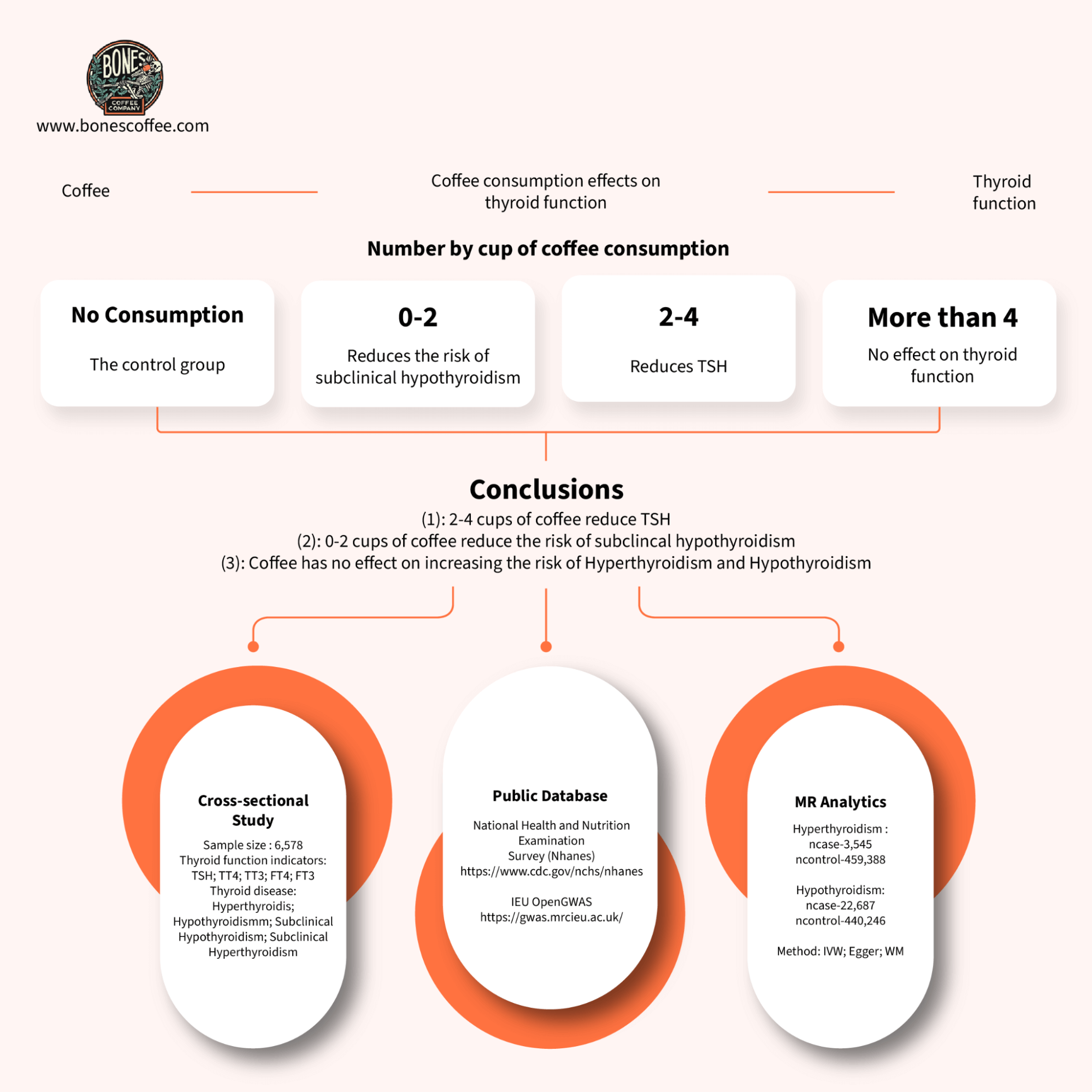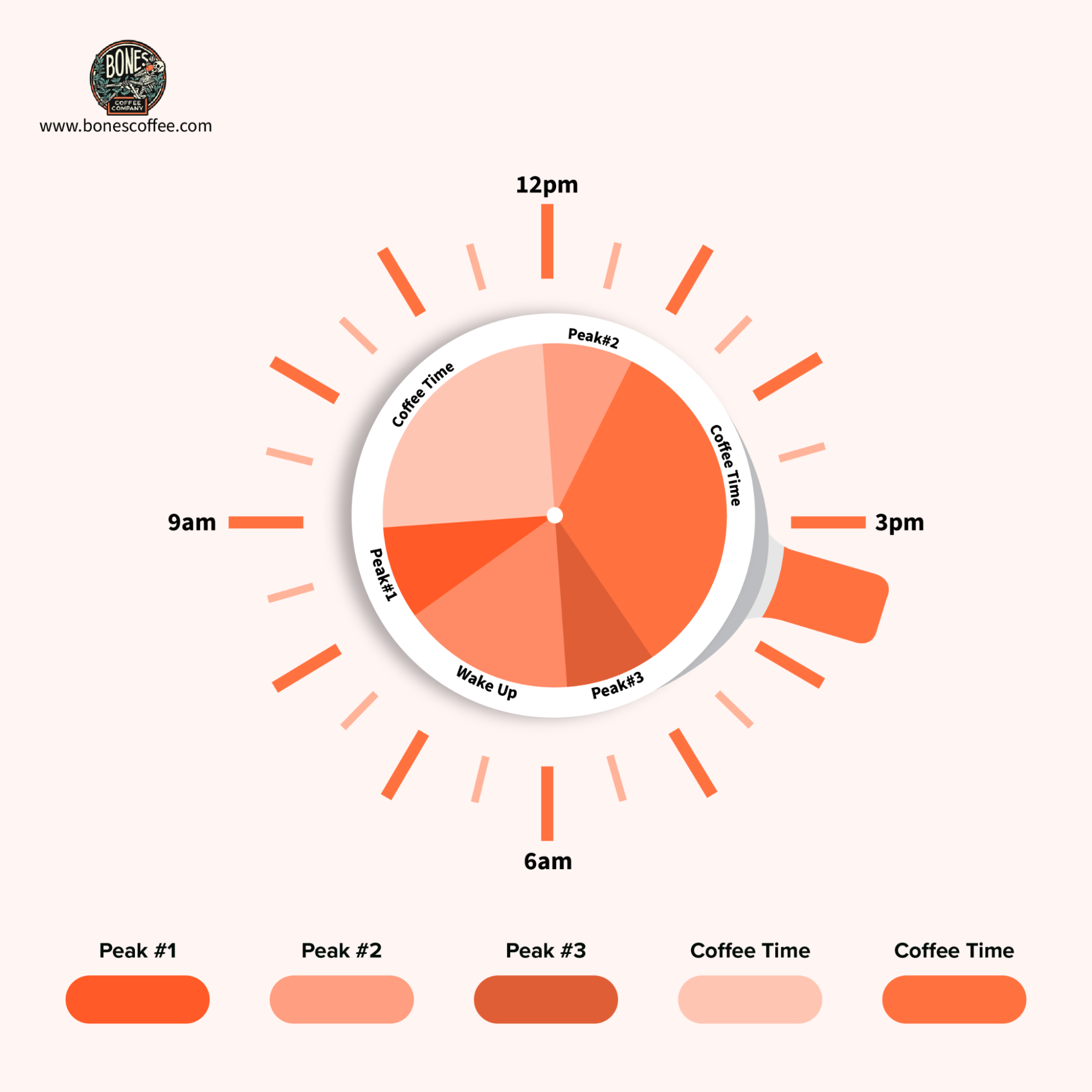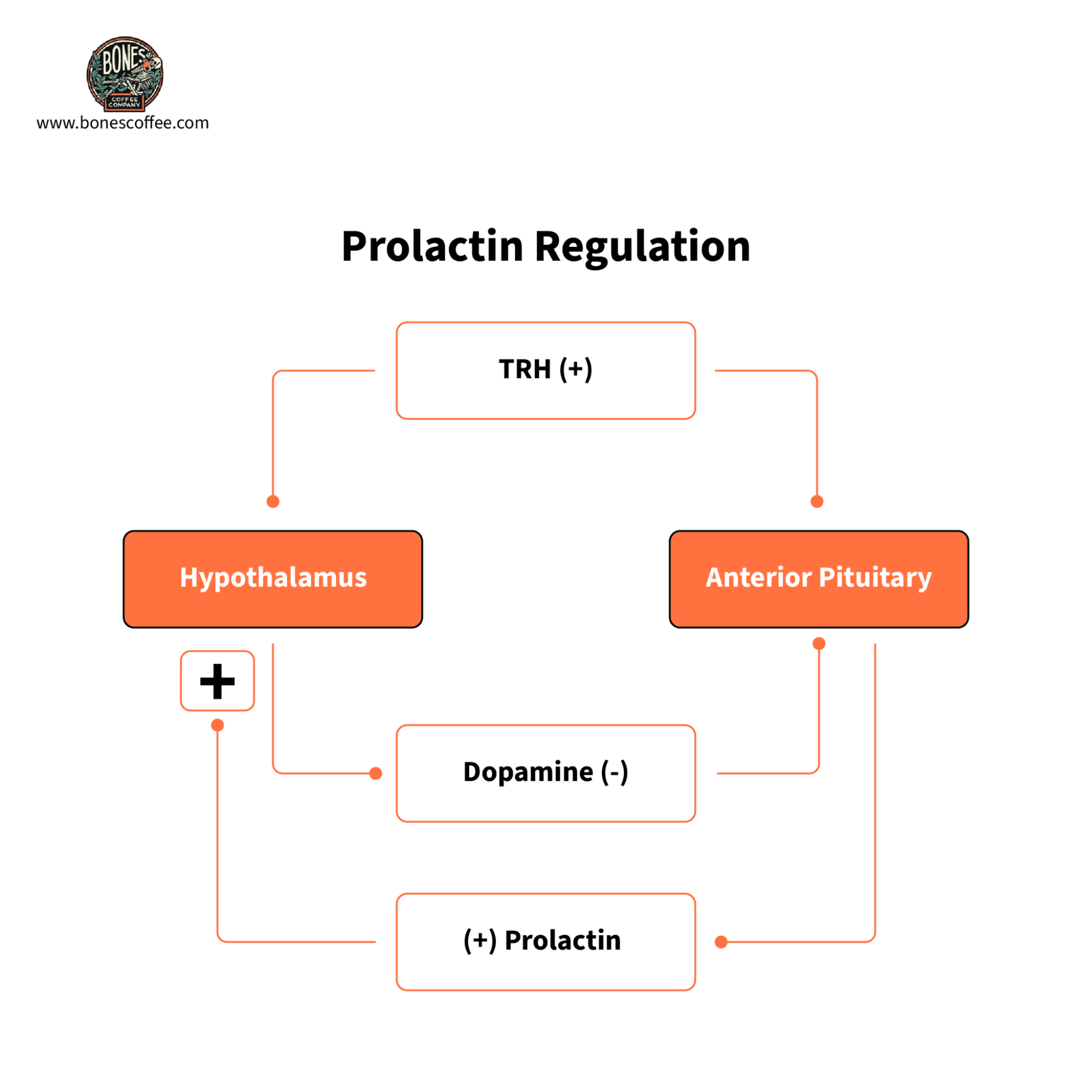 |  | ||
 |  | ||
Coffee is more than just a beloved beverage. It plays a pivotal role in influencing various hormones and health aspects. This detailed analysis delves into the intricate ways coffee consumption affects hormone levels, providing an in-depth exploration of its impact on cortisol, insulin, estrogen, and more.
From unraveling the science behind these hormonal changes to examining the broader health implications, this comprehensive guide offers everything you need to make informed decisions about your coffee intake. Whether you're a casual drinker or a dedicated coffee enthusiast, you'll gain valuable insights into how your favorite brew interacts with your body.
Increases Cortisol Level
Cortisol, often called the “stress hormone,” is produced by the adrenal glands.
They are crucial in various bodily functions, including metabolism, immune response, and stress management. They signal the body to awaken and become alert, which explains the elevated cortisol levels in the morning that gradually decline throughout the day, as seen in the graph below.
Given that cortisol levels are already high in the morning, waiting an hour or two after waking before consuming coffee is advisable. This is because the caffeine in coffee stimulates the adrenal glands to produce more cortisol, amplifying the stress response and potentially disrupting the body's natural hormone cycles.
More cortisol in the body could cause heightened stress responses, jitteriness, and increased anxiety. Waiting a few hours allows the body to utilize its natural energy resources first.
Caffeine increases cortisol production through several mechanisms:
Adenosine Receptor Antagonism
Caffeine blocks adenosine receptors, which generally promote relaxation and sleepiness. This blockage leads to increased neuronal firing and the release of neurotransmitters like dopamine and norepinephrine, which can stimulate the adrenal glands to produce more cortisol.
Hypothalamic-Pituitary-Adrenal (HPA) Axis Activation
Caffeine can activate the HPA axis, a complex set of interactions among the hypothalamus, pituitary gland, and adrenal glands.
The activation results in the secretion of corticotropin-releasing hormone (CRH) from the hypothalamus, which stimulates the pituitary gland to release adrenocorticotropic hormone (ACTH). This, in turn, prompts the adrenal glands to produce cortisol.
Sympathetic Nervous System Stimulation
By stimulating the sympathetic nervous system, caffeine increases the release of catecholamines.
Catecholamines are hormones the brain, nerve tissues, and adrenal glands produce. They play a crucial role in triggering the body's "fight-or-flight" response. Examples of these hormones include dopamine and adrenaline.
An increase in catecholamines can indirectly elevate cortisol levels as part of the body’s “fight or flight” response.
Lowers the Concentration of Thyroid Stimulating Hormones
The thyroid, the butterfly-shaped gland in your neck, produces hormones that regulate your metabolism, energy levels, and even your body temperature.
The thyroid gland produces hormones such as thyroxine (T4) and triiodothyronine (T3), which are crucial for regulating metabolism, energy levels, and overall hormonal balance.
The interaction between caffeine and thyroid hormones can be complex and is influenced by various factors, including dosage, individual health status, and concurrent medication use.
For instance, caffeine reduces the absorption of thyroid hormone medications, particularly levothyroxine (synthetic T4). It is for this reason that the University of California, Los Angeles (UCLA) Health, one of America’s top hospitals, recommends waiting 60 minutes after taking thyroid medication before consuming coffee or other caffeinated beverages.
A study by the National Library of Medicine on the effect of coffee consumption on thyroid function suggests that taking less than 2 cups of coffee daily leads to a reduced risk of subclinical hypothyroidism.
The same study adds that drinking two to four cups reduces serum (Thyroid-Stimulating Hormone) TSH concentrations. This means that moderate coffee consumption can influence thyroid hormone levels and TSH concentrations without necessarily causing thyroid disorders, potentially having a protective effect on thyroid function.
Lowers Insulin Sensitivity and Increases Insulin Resistance
Insulin is a hormone produced by the pancreas that allows cells to absorb glucose from the bloodstream for energy.
Adenosine, a neurotransmitter, helps regulate insulin production and sensitivity by binding to its receptors in the pancreas.
Caffeine acts as an adenosine receptor antagonist. By blocking adenosine receptors, caffeine increases the release of neurotransmitters like norepinephrine and dopamine. This can lead to increased glucose production in the liver, reducing insulin sensitivity by making it harder for cells to absorb glucose effectively.
Caffeine consumption stimulates the adrenal glands to release epinephrine (adrenaline). Elevated epinephrine levels can inhibit insulin secretion and promote glycogenolysis, the breakdown of glycogen to glucose, thereby increasing blood glucose levels.
Caffeine may affect the function of glucose transporters, particularly GLUT4, which is responsible for glucose uptake in muscle and fat cells. Altered GLUT4 activity can influence how effectively cells respond to insulin.
Can Coffee Consumption Lead to Insulin Resistance?
Insulin resistance is a condition where the body’s cells become less responsive to the hormone insulin, leading to elevated blood glucose levels.
Several mechanisms have been proposed to explain how coffee might influence insulin sensitivity:
- Caffeine content: Caffeine can acutely increase insulin resistance by promoting the release of adrenaline, which in turn raises blood glucose levels.
- Antioxidants: Coffee is rich in antioxidants, such as chlorogenic acid, which may improve insulin sensitivity by reducing oxidative stress and inflammation.
- Magnesium: Coffee contains magnesium, a mineral that plays a role in glucose metabolism and insulin action. Higher magnesium intake has been associated with a lower risk of insulin resistance.
- Polyphenols: These compounds, also found in coffee, may enhance insulin sensitivity by modulating glucose metabolism and improving endothelial function.
Influences Estrogen Levels
Estrogen, a primary female sex hormone, plays a crucial role in regulating the reproductive system, menstrual cycle, and secondary sexual characteristics.
According to a study published by the National Institutes of Health (NIH), Asian women who consumed an average of 200 milligrams or more of caffeine daily—approximately two cups of coffee—had elevated estrogen levels compared to those who consumed less.
The study also found that white women who consumed 200 milligrams or more of caffeine daily had slightly lower estrogen levels than those who consumed less. In contrast, black women who consumed the same amount of caffeine had elevated estrogen levels, but this result was not statistically significant.
Additionally, the findings indicated that consuming 200 milligrams or more of caffeine from coffee resulted in Asian women exhibiting elevated estrogen levels, white women having lower estrogen levels, and the results for black women were not statistically significant.
However, drinking more than one cup per day of caffeinated soda or green tea was linked to higher estrogen levels in Asian, white, and black women.
According to Enrique Schisterman, Ph.D., of the Division of Epidemiology, Statistics, and Prevention Research at the Eunice Kennedy Shriver National Institute of Child Health and Human Development (NICHD),
"The results indicate that caffeine consumption among women of child-bearing age influences estrogen levels. Short term, these variations in estrogen levels among different groups do not appear to have any pronounced effects.”
Are There Differences in Caffeine’s Impact on Estrogen Between Men and Women?
Caffeine’s impact on estrogen levels can vary between men and women due to differences in hormonal physiology and metabolism.
Estrogen, a primary female sex hormone, plays a crucial role in regulating various bodily functions, including reproductive health, bone density, and cardiovascular function.
In men, estradiol (the most powerful type of estrogen in the body) is present in smaller amounts but is still essential for modulating libido, erectile function, and spermatogenesis.
According to the University of Rochester Medical Center, normal estradiol levels are 30 to 400 picograms per milliliter (pg/mL) for premenopausal women, 0 to 30 pg/mL for postmenopausal women, and 10 to 50 pg/mL for men.
For women, particularly those of reproductive age, caffeine consumption has been associated with changes in estrogen levels, which can vary depending on the amount of caffeine consumed and individual metabolic responses.
For men, while estrogen is present in smaller amounts, caffeine can still impact its levels, but the effects are generally less pronounced compared to women.
Delays Melatonin Production
Melatonin is a hormone produced by the pineal gland in the brain, primarily responsible for regulating sleep-wake cycles.
The production of melatonin is influenced by the light-dark cycle, with levels typically rising in the evening to promote sleep and falling in the morning to help wakefulness.
Caffeine works by blocking adenosine receptors in the brain. Adenosine is a neurotransmitter that promotes sleep and relaxation. By inhibiting adenosine, caffeine increases alertness and delays the onset of sleep, indirectly affecting melatonin production.
Moreover, caffeine can shift the circadian rhythm, the body’s internal clock that regulates the sleep-wake cycle. This shift can delay the release of melatonin, making it harder to fall asleep at the usual time.
Therefore, drinking coffee or other caffeinated beverages in the evening can significantly delay melatonin production. The half-life of caffeine is approximately 5 hours, meaning that it can remain in the system and affect melatonin levels for several hours after consumption. To minimize the impact on melatonin production, it is generally recommended to avoid caffeine consumption at least 6 hours before bedtime.
Additionally, higher doses of caffeine have a more pronounced effect on melatonin suppression. Consuming large amounts of caffeine can lead to a more significant delay in melatonin production and a greater disruption of sleep patterns.
Keeping caffeine intake within moderate levels can help reduce its interference with melatonin production and subsequent sleep disturbances.
Inhibits Production of Vasopressin
Also known as antidiuretic hormone (ADH), vasopressin plays a crucial role in regulating the body's water balance and blood pressure.
The hormone is produced in the hypothalamus and stored in the pituitary gland, where it is released in response to changes in blood osmolality or blood pressure.
When coffee is consumed, its caffeine content acts as a diuretic, which can inhibit the release of vasopressin. This inhibition leads to increased urine production and a higher risk of dehydration.
As a result, frequent coffee drinkers may need to consume more water to compensate for the diuretic effects of caffeine, especially in environments where fluid balance is critical.
Reduces Testosterone Levels
Testosterone, a primary male sex hormone, plays a crucial role in muscle mass, bone density, and overall well-being.
While both men and women produce testosterone, the hormone is present in significantly higher levels in men.
According to the University of Rochester Medical Center, normal test results for total testosterone levels range from 270 to 1,070 nanograms per deciliter (ng/dL) for men, depending on age. In contrast, for women, normal levels range from 15 to 70 ng/dL.
Caffeine may influence testosterone levels through several mechanisms:
Aromatase Inhibition
Caffeine has been shown to inhibit aromatase, an enzyme that converts testosterone into estrogen. This inhibition can lead to higher circulating testosterone levels, as less testosterone is converted into estrogen.
The reduced activity of aromatase can help maintain a more favorable balance between testosterone and estrogen, especially in men. This effect may be particularly beneficial for those looking to enhance their muscle mass and strength, as higher testosterone levels are associated with increased muscle growth and recovery.
Corticosteroid Interaction
Caffeine leads to an increase in saliva corticosteroid concentrations, which can indirectly affect testosterone production.
Elevated cortisol levels, a type of corticosteroid, can suppress testosterone synthesis by interfering with the hormonal signals that regulate its production.
Chronic high cortisol levels, often due to prolonged caffeine intake, can decrease testosterone levels. This interaction underscores the importance of moderating caffeine consumption to avoid potential negative impacts on testosterone production and overall hormonal balance.
Luteinizing Hormone (LH) Stimulation
Some studies suggest that caffeine may stimulate the release of luteinizing hormone (LH), which can boost testosterone production in the testes. LH is a critical hormone in regulating the reproductive system, prompting the testes to produce and secrete testosterone.
Caffeine can contribute to increased testosterone levels by enhancing the release of LH, which is vital for muscle development, libido, and overall vitality. This mechanism highlights a potential positive effect of caffeine on male reproductive health and hormonal balance.
Triggers Adrenal Gland Function
Caffeine significantly impacts the adrenal glands, which produce hormones such as adrenaline (epinephrine) and cortisol. These hormones are crucial in the body’s stress response and energy regulation.
When caffeine is consumed, it triggers the adrenal glands to release adrenaline. This hormone prepares the body for a “fight or flight” response, leading to increased heart rate, elevated blood pressure, and a boost in energy levels.
The release of adrenaline can provide a temporary feeling of heightened alertness and improved physical performance.
Prolonged exposure to high levels of caffeine can overwork the adrenal glands, potentially leading to a condition known as adrenal fatigue. This condition is characterized by chronic tiredness, difficulty waking up, and a weakened stress response.
Continuous stimulation of the adrenal glands by caffeine can disrupt the balance of other hormones in the body, including those involved in reproductive health and metabolism.
Elevated cortisol levels can interfere with the natural sleep-wake cycle, making it difficult to fall asleep and stay asleep, which can further exacerbate adrenal fatigue and overall stress.
How Does Caffeine Affect Pregnancy Hormones?
During pregnancy, hormonal changes are significant, and the introduction of external stimulants like caffeine can influence these pregnancy hormones and their associated physiological processes.
Caffeine consumption during pregnancy can affect the levels of estrogen and progesterone, two critical hormones for maintaining pregnancy.
Studies have shown that caffeine can alter the metabolism of these hormones, potentially leading to imbalances.
Elevated caffeine intake has been associated with changes in estrogen levels, which can influence the risk of pregnancy-related complications.
What Are the Recommended Caffeine Limits for Pregnant Women?
The recommended caffeine limits for pregnant women, as shown in the table below, are established to minimize potential risks to both the mother and the developing fetus.
Food/Drink | Average Caffeine Amount in Milligrams (mg) |
Brewed coffee, 8 ounces | 135 mg (ranges between 80 to 200 mg) |
Instant coffee, 8 ounces | 75 mg |
Decaf coffee, 8 ounces | 2 to 15 mg |
Coffee ice cream or frozen yogurt, 4 ounces | 2 mg |
Brewed tea, 8 ounces | 45 mg (ranges between 15 to 60 mg) |
Instant tea, 8 ounces | 26 to 36 mg |
As per the table above, brewed coffee poses the highest caffeine intake at 135 mg per 8 ounces (ranging from 80 to 200 mg), followed by instant coffee at 75 mg. Decaf coffee and coffee ice cream have the lowest caffeine content, at 2 to 15 mg and 2 mg per serving, respectively.
Various health organizations have provided guidelines based on current research.
The American College of Obstetricians and Gynecologists (ACOG) advises that pregnant women limit their caffeine intake to less than 200 milligrams (mg) per day. This is roughly equivalent to one 12-ounce cup of coffee.
The World Health Organization (WHO) suggests a similar limit of 300 mg per day, though they emphasize that lower consumption is preferable.
Additionally, the European Food Safety Authority (EFSA) recommends a maximum of 200 mg per day for pregnant women.
Stimulates Glucagon Production
While insulin helps lower blood sugar levels, glucagon does the opposite - it raises them, ensuring that our bodies have a steady supply of energy even when we’re not eating.
This results in a sustained energy release that keeps you going, whether you’re powering through a grueling workout or simply trying to stay awake during a never-ending Zoom meeting.
Glucagon also plays a key role in fat burning. It signals your body to break down stored fat and use it as fuel.
Suppresses Leptin Levels
Coffee, particularly its caffeine content, can lower leptin levels in the body.
Caffeine stimulates the sympathetic nervous system, increasing metabolic rate and energy expenditure. This heightened activity can affect the secretion of hormones, including leptin.
Additionally, caffeine promotes lipolysis, the breakdown of fat stores in adipose tissue. As fat cells decrease in size, the production of leptin, which is largely produced by these cells, may also decline.
The interaction between caffeine and other hormones, such as cortisol, may indirectly affect leptin levels. Elevated cortisol levels from caffeine consumption can alter leptin secretion patterns.
The effects of caffeine on leptin can vary between short-term and long-term consumption, with acute intake potentially reducing leptin levels temporarily.
However, habitual consumption might lead to adaptive changes in hormone regulation. The degree to which coffee affects leptin levels can vary among individuals due to genetic factors, baseline metabolic rates, and differences in caffeine tolerance and sensitivity.
Decreases Production of the Hormone Prolactin
Coffee, specifically its caffeine content, can decrease the production of the hormone prolactin. Prolactin is primarily associated with lactation in females but also plays roles in metabolism, immune system regulation, and development.
Caffeine, a central nervous system stimulant, exerts its effects by blocking adenosine receptors, which can lead to increased dopamine levels. Elevated dopamine can inhibit prolactin secretion from the pituitary gland since dopamine acts as a prolactin-inhibiting factor. This reduction in prolactin production can be particularly noticeable with the acute consumption of caffeine.
Moreover, caffeine’s effect on prolactin levels can vary based on dosage, individual sensitivity, and frequency of consumption. Regular intake of coffee might lead to a sustained reduction in prolactin levels due to the continuous presence of caffeine in the bloodstream.
However, the degree of this inhibition can differ among individuals, influenced by genetic factors and baseline hormonal balances.
Additionally, other components in coffee besides caffeine, such as chlorogenic acids, might also contribute to the modulation of prolactin secretion, although their exact roles require further research.
Stimulates Release of Growth Hormone
Coffee, through its caffeine content, can stimulate the release of growth hormone (GH). Growth hormone, produced by the pituitary gland, plays a crucial role in growth, metabolism, and muscle development.
Caffeine acts as a stimulant to the central nervous system, which can lead to increased secretion of catecholamines like adrenaline. This increase in catecholamines can, in turn, stimulate the hypothalamus to release growth hormone-releasing hormone (GHRH), which prompts the pituitary gland to produce and release growth hormone.
Additionally, caffeine’s ability to enhance physical performance and increase metabolic rate may further contribute to the elevated secretion of growth hormone. Physical activity itself is a significant trigger for GH release, and caffeine can amplify this effect by enhancing workout intensity and endurance.
As a result, regular coffee consumption, especially when combined with exercise, can lead to sustained increases in growth hormone levels, benefiting muscle growth, fat metabolism, and overall physical performance.
However, the extent of this stimulation can vary depending on individual sensitivity to caffeine and other personal health factors.
Case Studies of Coffee's Impact on Hormonal Health
Caffeine, a ubiquitous psychostimulant found in coffee, has a complex impact on human health, particularly concerning neurological, psychiatric, and hormonal disorders. This review delves into two critical case studies highlighting caffeine's diverse effects.
Effect of Caffeine Consumption on Neurological and Psychiatric Disorders: A Gender-Specific Analysis
The case study by Hye Jin Jee, Sang Goo Lee, Katrina Joy Bormate, and Yi-Sook Jung examines the effects of caffeine consumption on various neurological and psychiatric disorders, highlighting sex differences.
Caffeine, found in coffee, tea, and cocoa, is a widely consumed mild stimulant. While moderate caffeine intake can have beneficial effects, excessive consumption can lead to symptoms such as anxiety, agitation, insomnia, and gastrointestinal disorders.
The study investigates how caffeine acts as either a protective or risk factor for neurological and psychiatric disorders and emphasizes the importance of personalized medicine, considering sex differences.
The review focuses on the prevalence and incidence of several neurological and psychiatric disorders, noting significant sex differences. For instance, stroke prevalence is higher in men, but mortality is higher in women.
Women also have higher risks for sleep disorders, dementia, and depression, while men are more prone to Parkinson's disease (PD) and neuromuscular diseases. Caffeine consumption appears to reduce the risk of developing Alzheimer's disease (AD) and PD, particularly in men. Still, it may increase the risk of anxiety and panic disorders, especially with high intake.
The study also highlights the role of estrogen in modulating caffeine's effects on the dopamine system. It suggests that caffeine's impact on disorders like PD and AD varies between sexes due to hormonal differences.
The review concludes that while caffeine can have protective effects against disorders like stroke, dementia, and depression, it also poses risks for sleep disorders and anxiety. The effects are sex-dependent, with women generally benefiting more from caffeine's protective effects against dementia and men from its protective effects against PD. The study calls for more research into the sex-specific effects of caffeine to develop tailored caffeine therapies.
Caffeine Toxicity in a 16-Year-Old
The review explores the toxicology of caffeine, a widely consumed psychostimulant, detailing its effects, pharmacokinetics, and toxicokinetics.
A case study of a 16-year-old male who died after consuming several caffeine-containing beverages highlights the potential for severe toxicity even at doses not typically considered lethal. This case underscores the need for further research into individual susceptibilities and genetic predispositions to caffeine toxicity. It also points to the importance of regulatory measures and increased awareness to prevent similar incidents, especially among young individuals and those with potential underlying health conditions.
While moderate consumption of caffeine is generally safe and can enhance alertness and concentration, excessive intake (typically above 1 gram) can lead to severe toxicity and even death. Symptoms of caffeine toxicity include cardiovascular, gastrointestinal, neurological, and metabolic issues.
The primary mechanism of action involves the antagonism of adenosine receptors, resulting in increased catecholamine levels. Management of caffeine intoxication includes supportive care, decontamination, and enhanced elimination techniques.
Optimize Your Health with Smart Coffee Choices
Coffee consumption has a profound impact on numerous hormone levels and overall health. It plays a multifaceted role in our hormonal balance by stimulating cortisol production, influencing thyroid function, affecting insulin sensitivity, and altering estrogen metabolism.
Additionally, its effects on testosterone, melatonin, and prolactin further underscore its complex interaction with our endocrine system. Understanding these relationships allows for more informed decisions regarding coffee intake, helping to maintain optimal health and hormonal balance. For those considering coffee consumption, weighing these hormonal effects and adjusting habits accordingly to support overall well-being is crucial.
Terms and Definitions
Neurotransmitters
Neurotransmitters are chemical messengers that transmit signals across synapses from one neuron to another or from neurons to muscles or glands. They play a crucial role in the functioning of the nervous system.
An illustration of this is dopamine, a neurotransmitter involved in reward, motivation, and the regulation of mood. Similarly, serotonin affects mood, appetite, and sleep.
Serum
Serum is the clear, yellowish fluid that remains after blood has clotted. It is devoid of cells and clotting factors but contains proteins, electrolytes, antibodies, antigens, and hormones.
To illustrate, a serum glucose test measures the level of glucose in the blood, commonly used to diagnose and monitor diabetes.
Insulin Sensitivity
Insulin sensitivity refers to how responsive the body's cells are to insulin. High insulin sensitivity allows the cells to use blood glucose more effectively, reducing blood sugar levels.
Take, for example, the fact that regular exercise and a healthy diet can improve insulin sensitivity, helping to prevent type 2 diabetes.
Antioxidants
Antioxidants are molecules that inhibit the oxidation of other molecules. Oxidation is a chemical reaction that can produce free radicals, leading to cell damage. Antioxidants protect the body from this damage.
A good example is vitamin C, vitamin E, and beta-carotene, which are well-known antioxidants found in fruits and vegetables. They help protect cells from damage caused by free radicals.
Endothelial Function
Endothelial function refers to the performance of the endothelium, the thin layer of cells lining the blood vessels. Proper endothelial function is crucial for vascular health, regulating blood flow, and preventing clotting.
As an example, endothelial dysfunction is associated with atherosclerosis, hypertension, and other cardiovascular diseases. It can be improved through lifestyle changes such as exercise and a healthy diet.
Light-Dark Cycle
The light-dark cycle refers to the natural pattern of light and darkness that occurs over a 24-hour period, influencing circadian rhythms in living organisms.
Consider how exposure to natural light during the day and darkness at night helps regulate the sleep-wake cycle in humans, promoting better sleep and overall health.
Corticosteroid
Corticosteroids are a class of steroid hormones produced by the adrenal cortex or synthesized for medical use. They are involved in various physiological processes, including immune response, inflammation, and metabolism.
One instance of this is prednisone, a synthetic corticosteroid used to treat inflammatory conditions such as asthma, arthritis, and allergic reactions.
Adrenal Fatigue
Adrenal fatigue is a term used to describe a collection of symptoms such as fatigue, body aches, and sleep disturbances, believed to be caused by chronic stress and adrenal insufficiency. However, it is not a medically recognized condition.
For instance, people experiencing chronic stress may report symptoms attributed to adrenal fatigue. Still, it is essential to seek medical advice as the symptoms may be due to other underlying health issues.
References
- Clinic, C. (2021) Cortisol: What It Is, Function, Symptoms & Levels, Cleveland Clinic. Available at: https://my.clevelandclinic.org/health/articles/22187-cortisol#:~:text=The%20level%20of%20cortisol%20in%20your%20blood%2C%20urine%20and%20saliva%20normally%20peaks%20in%20the%20early%20morning%20and%20declines%20throughout%20the%20day%2C%20reaching%20its%20lowest%20level%20around%20midnight..
- Sitzman, B. and Goode, R. (2013) Open for Discussion: Caffeine, American Chemical Society. Available at: https://www.acs.org/education/resources/highschool/chemmatters/past-issues/archive-2013-2014/caffeine.html#:~:text=Due%20to%20its%20similar%20structure.
- National Center for Biotechnology Information (2008) ‘Mechanisms underlying the metabolism of caffeine’, Journal of Clinical Psychiatry, 69(10), pp. 1445-1451. Available at:https://www.ncbi.nlm.nih.gov/pmc/articles/PMC2409189/.
- Van Soeren, M.H. and Graham, T.E. (1998) ‘Effect of caffeine on metabolism, exercise endurance, and catecholamine responses after withdrawal’, Journal of Applied Physiology, 85(4), pp. 1493–1501. Available at: https://doi.org/10.1152/jappl.1998.85.4.1493.
- Lai, Y.-W. and Huang, S. (2022) ‘Tea consumption affects the absorption of levothyroxine’, Frontiers in Endocrinology, 13. Available at: https://doi.org/10.3389/fendo.2022.943775.
- How Should I Take Thyroid Hormone (no date) www.uclahealth.org. Available at: https://www.uclahealth.org/medical-services/surgery/endocrine-surgery/conditions-treated/thyroid/how-should-i-take-thyroid-hormone#:~:text=Can%20I%20drink%20coffee%20with (Accessed: 2 July 2024).
- National Center for Biotechnology Information (2023) ‘Impact of coffee consumption on thyroid function’, International Journal of Endocrinology, 24(3), pp. 112-123. Available at:https://www.ncbi.nlm.nih.gov/pmc/articles/PMC10282749/.
- Rossi, S., et al. (2011) ‘Caffeine increases neurotransmitter release by removing inhibitory control for acetylcholine in the hippocampus and prefrontal cortex’, Frontiers in Neuroscience, 5, p. 116. Available at:https://www.frontiersin.org/journals/neuroscience/articles/10.3389/fnins.2011.00116/full.
- Van Soeren, M. et al. (1996) ‘Acute effects of caffeine ingestion at rest in humans with impaired epinephrine responses’, Journal of Applied Physiology (Bethesda, Md.: 1985), 80(3), pp. 999–1005. Available at: https://doi.org/10.1152/jappl.1996.80.3.999.
- Moon, S.-M. et al. (2021) ‘Effects of Coffee Consumption on Insulin Resistance and Sensitivity: A Meta-Analysis’, Nutrients, 13(11), p. 3976. Available at: https://doi.org/10.3390/nu13113976.
- Frontiers in Endocrinology (2022) ‘Impact of endocrine-disrupting chemicals on hormone regulation’, Frontiers in Endocrinology, 13, p. 1042044. Available at:https://www.frontiersin.org/journals/endocrinology/articles/10.3389/fendo.2022.1042044/full.
- Cahill, F. et al. (2013) ‘High Dietary Magnesium Intake Is Associated with Low Insulin Resistance in the Newfoundland Population’, PLoS ONE, 8(3). Available at: https://doi.org/10.1371/journal.pone.0058278.
- NIH Study shows caffeine consumption linked to estrogen changes (2015) National Institutes of Health (NIH). Available at: https://www.nih.gov/news-events/news-releases/nih-study-shows-caffeine-consumption-linked-estrogen-changes.
- Estradiol (Blood) - Health Encyclopedia - University of Rochester Medical Center (no date) www.urmc.rochester.edu. Available at: https://www.urmc.rochester.edu/encyclopedia/content.aspx?ContentTypeID=167&ContentID=estradiol#:~:text=Normal%20levels%20for (Accessed: 2 July 2024).
- Sitzman, B. and Goode, R. (2013) Open for Discussion: Caffeine, American Chemical Society. Available at: https://www.acs.org/education/resources/highschool/chemmatters/past-issues/archive-2013-2014/caffeine.html#:~:text=Caffeine%20in%20the%20Brain&text=Due%20to%20its%20similar%20structure.
- Narishige, S. et al. (2014) ‘Effects of caffeine on circadian phase, amplitude and period evaluated in cellsin vitroand peripheral organsin vivoin PER2::LUCIFERASE mice’, British Journal of Pharmacology, 171(24), pp. 5858–5869. Available at: https://doi.org/10.1111/bph.12890.
- Research, I. of M. (US) C. on M.N. (2001) Pharmacology of Caffeine, www.ncbi.nlm.nih.gov. National Academies Press (US). Available at: https://www.ncbi.nlm.nih.gov/books/NBK223808/#:~:text=The%20mean%20half%2Dlife%20of.
- Fenton, R.A. et al. (2015) ‘Caffeine-induced diuresis and natriuresis is independent of renal tubular NHE3’, American Journal of Physiology-Renal Physiology, 308(12), pp. F1409–F1420. Available at: https://doi.org/10.1152/ajprenal.00129.2015.
- Total Testosterone - Health Encyclopedia - University of Rochester Medical Center (no date) www.urmc.rochester.edu. Available at: https://www.urmc.rochester.edu/encyclopedia/content.aspx?contenttypeid=167&contentid=testosterone_total#:~:text=Normal%20test%20results (Accessed: 2 July 2024).
- Montenegro, J., Freitas-Silva, O. and Teodoro, A.J. (2022) ‘Molecular Mechanisms of Coffee on Prostate Cancer Prevention’, BioMed Research International, 2022, p. e3254420. Available at: https://doi.org/10.1155/2022/3254420.
- Zulkifly, M.F.M. et al. (2021) ‘The roles of caffeine and corticosteroids in modulating cortical excitability after paired associative stimulation (PAS) and transcranial alternating current stimulation (tACS) in caffeine-naïve and caffeine-adapted subjects’, Psychoneuroendocrinology, 127, p. 105201. Available at: https://doi.org/10.1016/j.psyneuen.2021.105201.
- Andrzej Przemysław Herman et al. (2024) ‘Effect of Caffeine on the Inflammatory-Dependent Changes in the GnRH/LH Secretion in a Female Sheep Model’, International Journal of Molecular Sciences, 25(5), pp. 2663–2663. Available at: https://doi.org/10.3390/ijms25052663.
- Be alert to the effects of too much caffeine (no date) www.hshs.org. Available at: https://www.hshs.org/st-francis/news/be-alert-to-the-effects-of-too-much-caffeine (Accessed: 2 July 2024).
- Suni, E. and Singh, A. (2023) Stages of sleep: What happens in a sleep cycle, Sleep Foundation. Available at: https://www.sleepfoundation.org/stages-of-sleep.
- National Childbirth Trust (2019) Pregnancy hormones: progesterone, oestrogen and the mood swings, NCT (National Childbirth Trust). Available at: https://www.nct.org.uk/pregnancy/how-you-might-be-feeling/pregnancy-hormones-progesterone-oestrogen-and-mood-swings.
- ACOG (2010) Moderate Caffeine Consumption During Pregnancy, Acog.org. Available at: https://www.acog.org/clinical/clinical-guidance/committee-opinion/articles/2010/08/moderate-caffeine-consumption-during-pregnancy.
- Restricting caffeine intake during pregnancy (no date) www.who.int. Available at: https://www.who.int/tools/elena/interventions/caffeine-pregnancy#:~:text=For%20pregnant%20women%20with%20high (Accessed: 2 July 2024).
- EFSA (2015) What is caffeine? Available at: https://www.efsa.europa.eu/sites/default/files/corporate_publications/files/efsaexplainscaffeine150527.pdf.
- Yamashita, K. et al. (2012) ‘Association of coffee consumption with serum adiponectin, leptin, inflammation and metabolic markers in japanese workers: A cross-sectional study’, Nutrition & Diabetes, 2(4), pp. e33–e33. Available at: https://doi.org/10.1038/nutd.2012.6.
- Farias-Pereira, R., Park, C.-S. and Park, Y. (2019) ‘Mechanisms of action of coffee bioactive components on lipid metabolism’, Food Science and Biotechnology, 28(5), pp. 1287–1296. Available at: https://doi.org/10.1007/s10068-019-00662-0.
- Rodak, K. et al. (2022) ‘The Examination of the Influence of Caffeinated Coffee Consumption on the Concentrations of Serum Prolactin and Selected Parameters of the Oxidative-Antioxidant Balance in Young Adults: A Preliminary Report’, Oxidative Medicine and Cellular Longevity. Edited by A. Ciobica, 2022, pp. 1–17. Available at: https://doi.org/10.1155/2022/1735204.
- Wu, B.-H. and Lin, J.-C. (2010) ‘Caffeine attenuates acute growth hormone response to a single bout of resistance exercise’, Journal of sports science & medicine, 9(2), pp. 262–9. Available at: https://www.ncbi.nlm.nih.gov/pmc/articles/PMC3761732/.







